Backroads and Ballplayers #74
Stories of the famous and not-so-famous men and women from a time when baseball was "Arkansas' Game." Backroads and Ballplayers Weekly is always free and short enough to finish in one cup of coffee.
Losing Dr. Bob, Dodgers-Padres, and the Lost Story of the Seventh Game of the 1934 World Series.
Dr. Robert “Bob” Reising
My good friend Dr. Robert Reising of Conway, Arkansas, passed away Saturday. He was a scholar, educator, author, and a warm, generous gentleman. He loved baseball and liked nothing better than a lively discussion of the game with his friends at the Robinson-Kell Chapter of SABR.
Among his many memorable baseball stories, “Dr. Bob”, as his baseball friends identify him, co-authored Chasing Moonlight with Robert Friedlander in 2009. Chasing Moonlight remains the definitive work on Moonlight Graham’s life story.
Reising lived a baseball life, but like Archibald Graham, his story goes far beyond the game. Dr. Reising played on Michigan State’s Big Ten Championship baseball team in 1954 and served as head baseball coach at Duke, Furman, and the University of South Carolina. Later, in a long career in higher education, he mentored hundreds of aspiring writers. Reising retired from the University of Central Arkansas in 2013 but continued to publish articles on Arkansas baseball history in 501 Life and other publications.
Links to Dr. Bob’s work will be posted in the 10/10 Update in this space.
Who Poked the Bear?
Last night the Dodgers and Padres played what on the surface might seem to be a lopsided playoff game before 50,000 despondent and subdued Dodgers fans. Not quite!
The “fun” started early, but was it all in fun or an ill-planned little jab at Dodger Nation that sets the tone for an acrimonious series that will escalate into a historically hostile NLDS?

In the bottom of the first inning, after Fernando Tatis Jr. had homered in the visitor’s half, Mookie Betts hit a towering fly ball two rows deep into the left field bleachers to tie the game. Or did left fielder Jurickson Profar steal it from the crowd? The broadcast guys weren’t quite sure.
Several seconds and a few bunny hops in front of the bleachers later, Profar, who is playful by nature, taunted the left field crowd for a few seconds, then turned and tossed “out one” toward the infield.
Profar considered the spontaneous event the greatest catch of his career. "That was one of my wishes -- I wanted to rob a homer," said an excited Profar. Even closeups of the Dodgers’ fans who had battled the Padres left fielder for the ball showed folks in Dodger Blue enjoying their moment in World Series history. Betts was arriving at third base before he and most Dodgers fans realized he didn't homer. A few innings and several home runs later the LA fans would lose their appreciation for Profar’s little joke.
In the sixth inning of a game still very much undecided with the Padres up 3-1, Tatis was hit by a pitch to start the inning. The plucking of the Padres superstar was enough to initiate a mild discussion between players with different perspectives. Tatis would eventually score to give the Padres a more comfortable lead and finally move the home fans from good humor to anger.
As Yu Darvish was getting ready to begin the bottom of the seventh, a fan threw a baseball in Profar's direction. While Profar was approaching the umpire, another baseball rolled near him, Soon, all of the Padres' starting position players huddled on the field with Manny Machado giving the keynote address.
Things had reached a crisis. I may have been the only person who saw an Arkansas connection. Maybe Profar would be ejected for his own good. There is a precident for that.
Lost Story: Game Seven, 1934 World Series, Diz and Landis make Headlines
Despite the limited opportunities for spots on 16 major league teams and the relatively small rural population, Arkansans played a disproportionately important role in major league baseball in the first half of the 20th century. Perhaps that success was never more evident than in 1934.
In the voting for the 1934 Most Valuable Player Award, baseball’s highest honor, Dizzy Dean was chosen for the National League award. Waldo, Arkansas’ Travis Jackson finished fourth, Paul Dean was ninth, Montgomery County’s Lon Warneke, ranked thirteenth in the vote, and Madison County native Joseph Floyd “Arky” Vaughan was twenty-third. Over in the American League, Schoolboy Rowe finished fourth in the MVP vote. Bill Dickey of Kensett was named the American League All-Star catcher.
Regular Season:
After finishing fifth in 1933, the Detroit Tigers coasted to a seven-game margin over the Yankees to claim the American League pennant in 1934. The Tigers’ ace pitcher was a tall lanky youngster from El Dorado, Arkansas, named Lynwood Thomas Rowe. The 24-year-old Rowe posted 24 victories including 16 straight wins in late summer. Given the nickname, “Schoolboy” in his youth when he dominated older men in local semi-pro games, Rowe’s unsophisticated ways and his public romance with his high school sweetheart, Edna Skinner, made him a folk hero in Detroit.
Over in the National League, the St. Louis Cardinals came from seven games behind on Labor Day to overtake the defending World Champion New York Giants by two games. Two Arkansas-born brothers, Paul Dee “Daffy” Dean, and Jay Hanna “Dizzy” Dean, won 12 of the last 25 games. Diz had predicted that “Me and Paul will win 45.” The pair combined for 49 wins. Dizzy recorded 30 and his rookie brother won 19. The rowdy, boisterous, 1934 version of the Cardinals would forever be known as the “Gas House Gang.”
The 1934 World Series
The Redbirds seemed determined to live up to the Gas House Gang image. Mostly rural southerners, with a brash city boy or two thrown in, the Cards sparred with opponents and occasionally with each other. They were loud, cocky, and confrontational. All acceptable traits when a team comes from seven down to win the pennant in the last week. When asked for a comment on the pitching outlook for the series, Dizzy Dean, the unofficial gang leader, confidently predicted, “Me and Paul will probably win all four.”
The Tigers were quietly confident. They had dominated an American League that included the Babe Ruth-led Yankees. The Tigers had an outstanding pitcher of their own in Schoolboy Rowe and they would have home-field advantage for the first two series games.
Diz Wins Game One
Diz boasted to anyone who would listen that Game One was a sure win for the Cardinals proclaiming, “It ain’t braggin’ if you can do it.” In a move questioned by Detroit sportswriters, Detroit manager, Mickey Cochrane, chose veteran General Crowder to oppose Dizzy, saving Schoolboy Rowe for Game Two.
Fulfilling his ostentatious prediction, Diz won Game One comfortably by an 8 – 3 margin. Perhaps intimidated by the brash Cardinals, the jittery Tigers committed 5 errors and gave up three unearned runs.
Schoolboy Invokes Edna to Win Game Two
Schoolboy Rowe started Game Two with the same shaky symptoms the Tigers had exhibited in Game One. After three innings, the Cardinals had five hits and led 2 – 0. As he often did, Rowe paced around the mound, looked at the ball, and quietly talked to Edna, “Come on Edna, here we go.” Miraculously, after the unsettling start, Rowe retired 27 of the next 28 batters and although it took 12 innings, the Tigers prevailed 3 – 2.
Paul Dean Does His Part, Wins Game Three
The series moved to St. Louis for Game Three and it was rookie Paul Dean’s turn to live up to Dizzy’s predictions. In typical Dean fashion, he did just that, scattering eight hits and not allowing a run until the ninth inning. The Cardinals’ 4 – 1 win gave St. Louis a 2 – 1 lead in the series.
No Arkansas Pitchers, but Diz is the Big Story in Game Four
In the bottom of the fourth inning of Game Four, with the Cardinals down one run, Dizzy Dean volunteered his services as a pinch-runner. The next batter grounded sharply to second base in what looked like a sure double play. The throw to second forced Dean, but Diz came into second without sliding. The throw from the shortstop hit Dean directly in the forehead. Out cold for several minutes, Diz was carried off the field by teammates. The Tigers went on to win 10 – 4. Dizzy Dean, the scheduled pitcher for the next day, was rushed to the hospital.
The headlines in the next day’s newspaper would add another signature anecdote to the Dean legend, “X-rays of Dean’s Head Show Nothing.”
Tigers Win Game Five , beat Dizzy Dean
Despite being knocked unconscious the previous day, the elder Dean pitched well in game 5. Unfortunately for the Cardinals, the Tigers’ Tommy Bridges was better, and Detroit prevailed 3 – 1. The Tigers were one game away from claiming the series. The next day’s game would be in Detroit, and Schoolboy was ready.
Paul Dean Outduels Schoolboy and Drives in the Winning Run in Game Six
Billed as a showdown between two Arkansas country boys, the game was the turning point of the 1934 Fall Classic. Rowe had thrown 132 pitches in Game Two four days earlier, and although he gave a courageous effort the Cards edged the Tigers 4 – 3. Paul Dean gave up only seven hits and drove in the decisive run.
Game 7, Diz backs His word and Landis/Medwick Lost Story
The Tigers had battled the Cardinals heroically for six games but had little left for Game Seven. Dizzy Dean, on the other hand, pitching on two days’ rest, pitched his best game of the World Series, winning the deciding game 11- 0. Although Paul Dean may have provided the clutch performance in the series by winning Game Six and driving in the winning run, Dizzy Dean will always be the lead character in the story of the 1934 World Series.
Paul Dean’s two wins and clutch hit are lost stories in Arkansas baseball history as is the unusual story of Commissioner Kenesaw Mountain Landis and a rowdy, ultra-competitive firebrand named Joseph Michael “Ducky” Medwick.
Although Dizzy pitched well in the deciding seventh game, he did not need his best game. The Gas House Gang got out to an early lead and by the sixth inning the Cards were leading 7-0. Despite the comfortable lead the Cardinals played the only way the Gas House Gang could play.
Pepper Martin led off the inning with a single and made it to second when Goose Goslin misplayed the ball. After two routine outs, Ducky Medwick hit a line drive off the right field bleachers, scoring Martin.
In typical Medwick fashion, an RBI double in a lopsided game looked like a triple to him. As he slid into third base, Marvin Owen, the Tiger third sacker, spiked Medwick in the leg.
Of course, Medwick had to retaliate. Still lying on the ground after the slide, he kicked the third baseman in the stomach with both feet. The two combatants were quickly separated. Medwick would later score another meaningless run and the inning ended with St. Louis holding a 9-0 lead.
When Medwick took the field in the bottom of the sixth, Detroit fandom greeted him with a cascade of boos and any handy item they could throw. Obviously, ballgame food was different in those days. Newspapers the next day mentioned apples, oranges, and grapefruit as the projectile of choice, but soft drink bottles were also in the weapon mix.
The umpires halted play and sent workers out with burlap bags to pick up the thrown items. Both managers called for order but when Medwick attempted to take the field, the crowd resorted to the last of their available items, hot dogs and folded up newspapers. After a delay of 17 minutes, Commissioner Landis called Owen, Medwick, and the two managers to his box and held court. The commissioner reportedly asked Medwick if he had any reason to kick Owen. When Medwick replied that he actually did not, Landis ejected him from the game for “his own protection.”
Medwick was escorted from the field by five policemen. The commissioner later defended his actions: “I saw what Medwick did and I couldn’t blame the Detroit crowd for what it did. I did the proper thing.”
The Cardinals replaced Medwick in left field and the game continued, with the Cardinals eventually posting an 11-0 victory and winning the world championship. I would guess the Dodgers’ fans would have been pleased to see the same fate for Jurickson Profar, for his own protection, of couse.
Christmas season special on signed books: Link to book ordering page.

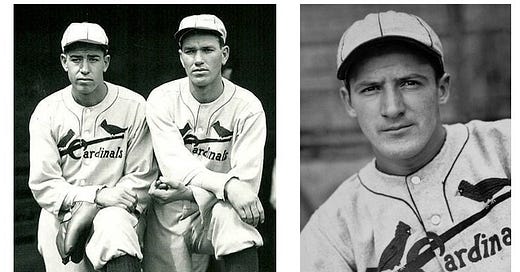



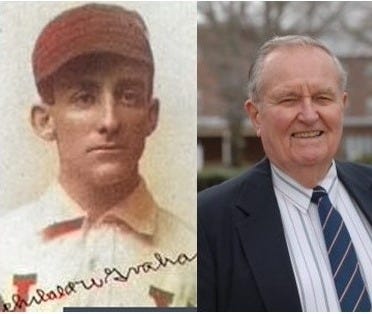

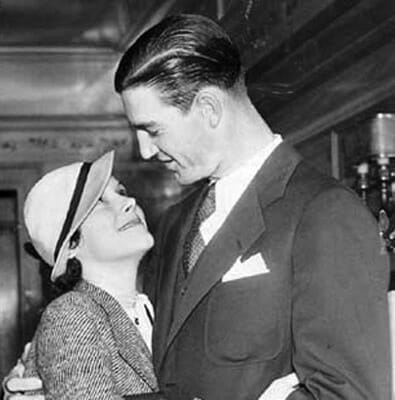

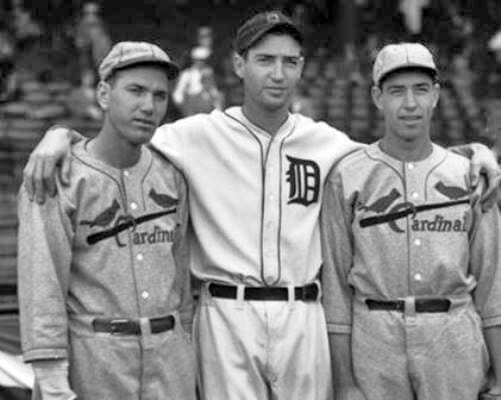
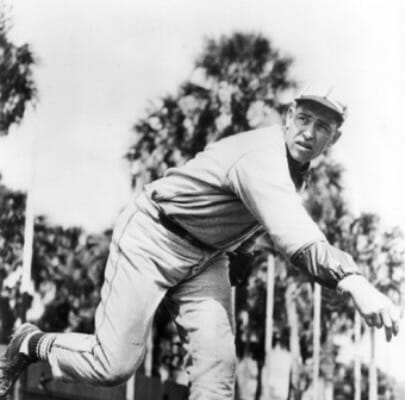

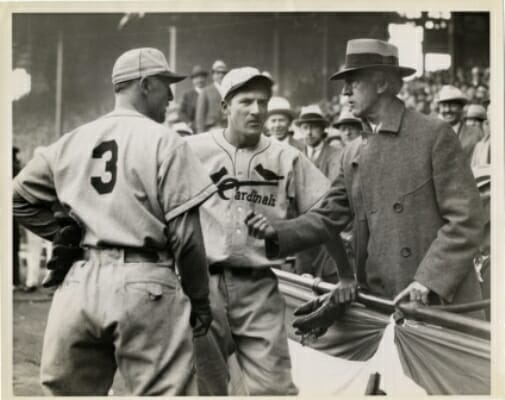
I had not heard about Dr. Bob. I'll miss him at our meetings. Such a nice man.
Sorry to hear that about Dr. Bob. I believe I met him once but I know you have referred to him many times.